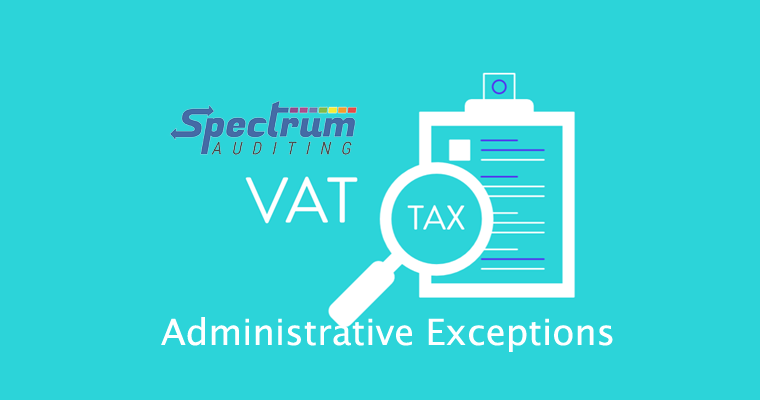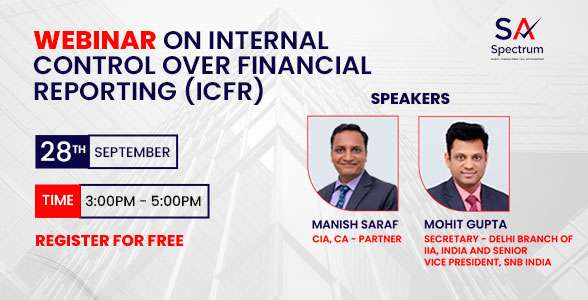Following is an extract from the guidance issued by FTA in regards to Administrative Exception (March 2020):
1. Brief overview of this user guide
This guide is prepared to help you submit your VAT Administrative Exception request
(referred to as ‘Exception Request’) to the Federal Tax Authority (FTA) related to the specific cases detailed below. It provides you with:
an overview of the categories for which an Exception Request can be made.
an explanation of the icons and information you might see or need to complete the form.
If you have additional questions on specific fields in the VAT Administrative Exception Form, please contact us at [email protected].
2. Purpose of the VAT Administrative Exception Form
2.1 What is a VAT Administrative Exception?
A VAT Administrative Exception is a mechanism which provides registrants with concessions / exceptions allowed by the Federal Decree-Law No. 8 of 2017 on Value Added Tax (“Law”) or Cabinet Decision No 52 of 2017 on the Executive Regulations of the Federal Decree-Law No. 8 of 2017 on Value Added Tax (“Executive Regulations”) if difficult circumstances prevent them from following certain procedural aspects of the Law or the Executive Regulations.
VAT Administrative Exceptions are grouped into the following categories and are relevant to VAT only:
- Tax Invoices
- Tax Credit Notes
- Length of the Tax Period
- Stagger
- Evidence to prove export of goods
- Time for the export of goods
Details of the above categories are documented in section 2.3.
NOTE: VAT and Excise Tax registration exceptions are not covered under this process. Exceptions related to VAT and Excise Tax registrations can be done on the relevant registration forms.
2.2 Who is eligible to make a VAT Administrative Exception Request?
The applicant must:
- be a registrant with the FTA;
- satisfy the requirements in respect of the relevant Exception Request, as outlined below; and
- provide all relevant supporting documentation.
2.3 What are the categories covered under VAT Administrative Exception?
As stated above, an Exception Request can be made only in respect of certain specified categories. Such categories and the underlying conditions for the exceptions along with reference from the Law are set out below:
| Category | Case/ scenario | Reference in the law | Conditions | |
| Tax Invoices | A registrant can make a Request to:
a) not mention any of the particulars specified in Article 59(1) or Article 59(2) of the Executive Regulations for Tax Invoices; or b) not issue Tax Invoices in certain cases.
|
Article 59(7) of the Executive
Regulations |
The registrant must be able to demonstrate that sufficient records are available to establish the particulars of any supply, and prove that it would be impractical to issue a tax invoice as per Article 59(1) or Article 59(2) of the Executive Regulations.
|
|
| Tax Credit Notes | A registrant may make a Request to:
a) not mention any of the particulars, as prescribed in Article 60(1) of the Executive Regulations for Tax Credit Notes; or b) not issue a Tax Credit Note in certain cases.
|
Article 60(2) of the Executive
Regulations |
The registrant must be able to demonstrate that sufficient records are available to establish the particulars of any supply, and prove that it would be impractical to issue a Tax Credit Note as per Article 60(1) of the Executive Regulations.
|
|
| Length of the Tax
Period |
A registrant may make a request to change the length of the Tax Period.
If the registrant chooses to change the length of the Tax Period to half yearly (6 months), the FTA will only consider allowing this for the following categories:
|
Article 62(2) of the Executive
Regulations
|
The registrant must provide the reasons for requesting a change in the length of the Tax Period.
If the registrant chooses to change the Tax Period to half yearly (6 months), the registrant must provide the following information depending on the category the registrant falls under:
|
|
| Category | Case/ scenario | Reference in the law | Conditions | |
| a) Individuals: | ||||
| Individuals who can apply to change the Tax Period are board members, property owners and other individuals such as freelancers. The FTA will consider all the supplies made by such persons before arriving at a decision.
|
•
• •
|
Number of invoices issued in the preceding 12 months Total tax paid in the preceding
12 months Taxable supplies in the preceding 12 months |
||
| b) Businesses in a constant refund | ||||
| position:
Businesses that were in a refund position in all the Tax Periods in the preceding 12 months, and expect to remain in the same position.
|
|
Whether the registrant expects any change in the business model, which may result in a change of refund position | ||
| c) Small and medium enterprises (SME) | ||||
| with funding:
Registered SMEs which receive official funding approved by the Government can apply to change their Tax Period.
|
•
•
|
Total tax paid in the preceding
12 months Taxable supplies in the preceding 12 months |
||
| d) Small and medium enterprises (SME) without funding:
Registered SMEs which do not receive official funding approved by any Government entity provided the total value of Taxable supplies in the preceding 12 months was equal to or less than AED 9 million.
|
• • • |
Total tax paid in the preceding
12 months Taxable supplies in the preceding 12 months Whether the registrant has received any penalties in the preceding 12 months
|
||
| Category | Case/ scenario | Reference in the law | Conditions | |
| Stagger | A registrant who is on quarterly filing, may request a change in the stagger assigned to him so that the Tax Period ends with the month requested by him.
|
Article 62(3) of the Executive Regulations | The registrant must provide the reasons for requesting the change in stagger. | |
| Evidence to prove export of goods | A registrant may request the FTA to allow the use of an alternative form of evidence to prove the export of goods.
The FTA, on reviewing the request, may specify an alternative form of evidence according to the nature of export or according to the nature of the goods being exported.
|
Article 30(6) of the Executive
Regulations |
The registrant must provide the actual reasons / circumstances for requesting an approval to allow the use of an alternative form of evidence. | |
| Time for the export of goods | A registrant may request an extension of time to physically export goods outside the UAE.
The FTA can extend the 90-day period from the date of supply, if the FTA has determined, after the supplier has applied in writing, that either of the following applies:
• Circumstances beyond the control of the supplier and the recipient of the goods have prevented, or will prevent, the export of the goods within 90 days of the date of supply. • Due to the nature of the supply, it is not practicable for the supplier to export the goods, or the class of goods, within 90 days of the date of supply. |
Article 30(7) of the Executive
Regulations |
The registrant must provide the actual reasons / circumstances, as prescribed under the law, to seek an extension of time for the export of goods. | |
If you need any assistance in submitting an administrative exception, kindly reach out Spectrum at +971 50 9866466 (or) +971 4 2699329. Alternatively, you can also email us at [email protected]
This article is based on the user guide issued by FTA and you can download complete guide as pdf from here



 contact us
contact us